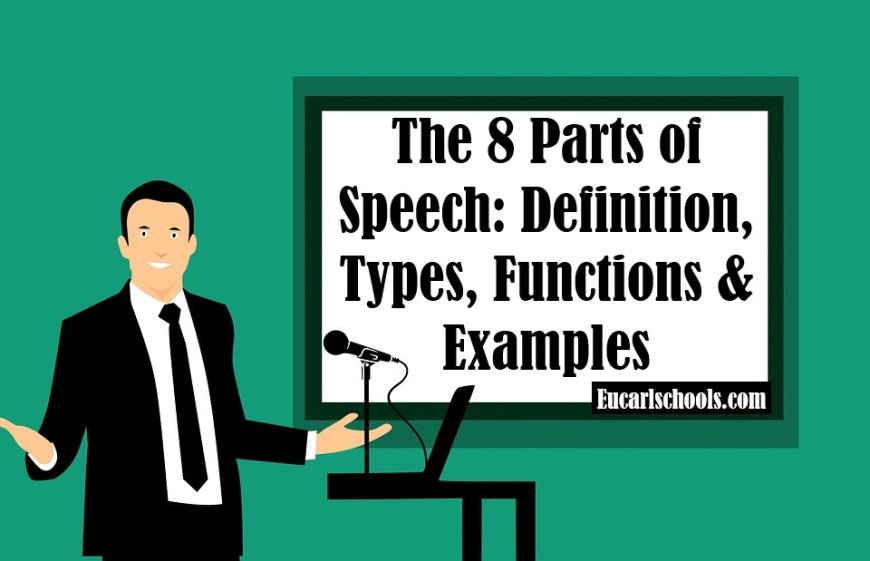Parts of speech - Definition, Types, Functions with examples.
In grammar, a part of speech or part-of-speech (abbreviated as POS or PoS, also known as word class or grammatical category is a category of words (or, more generally, of lexical items) that have similar grammatical properties.

Parts of speech Definition:
In grammar, a part of speech or part-of-speech (abbreviated as POS or PoS, also known as word class or grammatical category is a category of words (or, more generally, of lexical items) that have similar grammatical properties.
Types of part of speech with examples:
There are eight traditional parts of speech in English language, each of which serves a unique grammatical function. The types of parts of speech and some examples of each are:
-
Noun with examples:
A noun is a word that names a person, place, thing, idea, or concept. Here are some examples of nouns:
- Person: Mary, teacher, doctor
- Place: New York, park, beach
- Thing: car, book, chair
- Idea: love, happiness, freedom
- Concept: democracy, education, technology
Here are some sentences using nouns:
- Mary is a teacher at the local school.
- New York is a popular tourist destination.
- The car is parked in the garage.
- Love is a powerful emotion.
- Democracy is an important political concept.
2.Pronoun with exampleA pronoun is a word that takes the place of a noun in a sentence. Here are some examples of pronouns:- Personal pronouns: I, you, he, she, it, we, they
- Possessive pronouns: mine, yours, his, hers, its, ours, theirs
- Demonstrative pronouns: this, that, these, those
- Relative pronouns: who, whom, whose, which, that
- Interrogative pronouns: who, whom, whose, what, which
Here are some sentences using pronouns:
- She is going to the store.
- I love this song.
- Whose book is this?
- They are coming over for dinner tonight.
- What do you want for breakfast?
3. Verb with examplesA verb is a word that expresses an action, occurrence, or state of being in a sentence. Here are some examples of verbs:- Action verbs: run, jump, sing, dance, eat
- Helping verbs: is, are, am, was, were, have, has, had, do, does, did
- Modal verbs: can, could, may, might, shall, should, will, would, must
- Linking verbs: be, seem, appear, become, feel, look, sound, taste
Here are some sentences using verbs:
- She runs every morning.
- They are dancing at the party.
- He has been working all day.
- You should eat your vegetables.
- The cake smells delicious.
4. Adverb with examplesAn adverb is a word that modifies a verb, adjective, or another adverb in a sentence. Here are some examples of adverbs:- Adverbs of manner: quickly, slowly, carefully, happily, angrily
- Adverbs of time: now, soon, yesterday, tomorrow, always
- Adverbs of place: here, there, nearby, far away
- Adverbs of degree: very, extremely, quite, too, enough
- Adverbs of frequency: often, sometimes, rarely, never
Here are some sentences using adverbs:
- She sings beautifully.
- He walks slowly to school.
- They are studying hard for the exam.
- The cat is sleeping peacefully.
- We always have fun at the park.
5. Adjective with examplesAn adjective is a word that describes or modifies a noun or pronoun in a sentence. Here are some examples of adjectives:- Descriptive adjectives: beautiful, tall, blue, delicious, happy
- Quantitative adjectives: one, two, three, many, few
- Demonstrative adjectives: this, that, these, those
- Possessive adjectives: my, your, his, her, its, our, their
- Interrogative adjectives: which, what, whose
Here are some sentences using adjectives:
- She has a beautiful voice.
- The tall building is located downtown.
- The blue sky looks so serene.
- This delicious pizza is my favorite.
- They are happy to see each other again.
6. Preposition with examplesA preposition is a word that shows the relationship between a noun or pronoun and other words in a sentence. Here are some examples of prepositions:- Location prepositions: in, on, at, under, over, beside
- Time prepositions: during, after, before, at, on, in
- Direction prepositions: to, from, into, out of, towards, away from
- Agent prepositions: by, with, through, for, of
- Purpose prepositions: for, to, in order to, so as to
Here are some sentences using prepositions:
- The book is on the table.
- We will have dinner at the restaurant.
- She walked towards the park.
- The package was delivered by the postman.
- He studies hard for his exams.
7. Conjunction with exampleA conjunction is a word that connects words, phrases, or clauses in a sentence. Here are some examples of conjunctions:- Coordinating conjunctions: and, but, or, so, for, yet, nor
- Subordinating conjunctions: because, although, while, since, if, when, before, after
- Correlative conjunctions: either...or, neither...nor, both...and, not only...but also
Here are some sentences using conjunctions:
- She likes to swim and bike.
- I am tired, but I still have work to do.
- Do you want pizza or pasta for dinner?
- He is sick, so he won't be able to come to the party.
- Neither John nor Lisa will be able to attend the meeting.
- I will both cook dinner and do the dishes tonight.
8. Interjection with exampleAn interjection is a word or phrase used to express strong emotions or feelings in a sentence. Here are some examples of interjections:- Wow! (expressing surprise)
- Oh no! (expressing disappointment or concern)
- Yay! (expressing joy or excitement)
- Ouch! (expressing pain)
- Alas! (expressing sorrow or regret)
Here are some sentences using interjections:
- Wow! That is an amazing view.
- Oh no! I forgot my keys at home.
- Yay! We won the game.
- Ouch! That hurt my foot.
- Alas! I wish I had studied harder for the exam.
Frequently asked questions on parts of speechHere are some frequently asked questions on parts of speech:-
What is the definition of parts of speech? A: Parts of speech are the basic categories of words in a language based on their grammatical function and meaning.
-
How many parts of speech are there in English? A: There are eight traditional parts of speech in English: noun, verb, adjective, adverb, pronoun, preposition, conjunction, and interjection.
-
What is the function of a noun in a sentence? A: Nouns are used as subjects, objects, and complements in a sentence. They also function as the head of a noun phrase and can be modified by adjectives.
-
What is the function of a verb in a sentence? A: Verbs are used to express an action, occurrence, or state of being. They form the predicate of a sentence and can be modified by adverbs.
-
What is the function of an adjective in a sentence? A: Adjectives modify nouns and pronouns by describing their quality or attributes.
-
What is the function of an adverb in a sentence? A: Adverbs modify verbs, adjectives, and other adverbs by indicating the manner, degree, time, or frequency of an action or event.
-
What is the function of a preposition in a sentence? A: Prepositions show the relationship between a noun or pronoun and other words in a sentence, indicating direction, location, or time.
-
What is the function of a conjunction in a sentence? A: Conjunctions connect words, phrases, or clauses in a sentence.
-
What is the function of an interjection in a sentence? A: Interjections express emotions or feelings and are often inserted into a sentence as an exclamation.
-
How do I identify the parts of speech in a sentence? A: You can identify the parts of speech in a sentence by looking at the function and meaning of each word in the context of the sentence.
What's Your Reaction?


























































